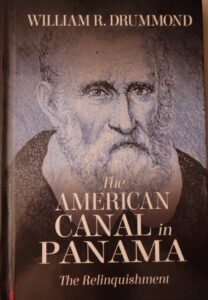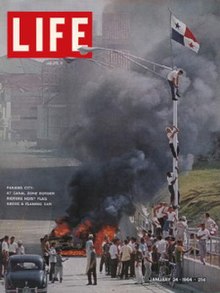 This is the story of William Drummond, a president of the local Canal Zone AFGE (American Federation of Government Employees) union. He came to the Canal Zone as an Army sergeant stationed at Fort Kobi, and he witnessed the historic 1964 riots. His account of the riots is both interesting and insightful. After discharging from the Army, Drummond began his career as a Panama Canal employee and married a Panamanian woman who happened to be the aunt of two of the men that planted the flag on top of a light pole on Fourth of July Avenue and I Avenue. A picture of the flag placed there was later published by Life magazine. The Panamanians refer to this event as Martyrs’ Day. Martyrs’ Day (Panama) – Wikipedia
This is the story of William Drummond, a president of the local Canal Zone AFGE (American Federation of Government Employees) union. He came to the Canal Zone as an Army sergeant stationed at Fort Kobi, and he witnessed the historic 1964 riots. His account of the riots is both interesting and insightful. After discharging from the Army, Drummond began his career as a Panama Canal employee and married a Panamanian woman who happened to be the aunt of two of the men that planted the flag on top of a light pole on Fourth of July Avenue and I Avenue. A picture of the flag placed there was later published by Life magazine. The Panamanians refer to this event as Martyrs’ Day. Martyrs’ Day (Panama) – Wikipedia
 William Drummond worked for the Canal Zone Police Division, and in his book An American Canal in Panama, he provides a lot of research and background (some documented and some not) information revealing an inside view of the Canal Zone governance and social dynamics. The life details he provides are not packaged in a pretty gift of nostalgia, but can be gritty and raw. That’s the way life is.
William Drummond worked for the Canal Zone Police Division, and in his book An American Canal in Panama, he provides a lot of research and background (some documented and some not) information revealing an inside view of the Canal Zone governance and social dynamics. The life details he provides are not packaged in a pretty gift of nostalgia, but can be gritty and raw. That’s the way life is.
In his story, Drummond brings to light retaliation he faced as a union representative as well as his efforts in Washington D.C. to battle Panama Canal Treaty Violations. One retaliation he faced was trouble with the IRS (Internal Revenue Service). He mentions that the IRS was used as a tool to control or damage individuals who created problems This also happened to my own father who “blew the whistle” on some Canal Zone shenanigans. My father had a visit from the IRS, and it took several years, a lot of money, and the work of Senator Jesse Helmes to finally resolve this bogus issue. My dad, like Drummond, was found not guilty of any violation of IRS regulation. Drummond reports that he has heard from other Canal Zonians who have had similar experiences with an IRS type of retaliation, and I have also heard similar reports from others.
The American Canal in Panama does a very good job depicting the complexities of the Panama Canal treaties. I appreciate the work William Drummond did on his book, and I appreciate his work on fighting the treaty negotiations. The underlying political and societal background in Drummond’s book provides a fuller picture of Canal Zone life during the time period I lived there; however, being so young, I had little knowledge of these events. So, this book has a place on my bookshelf of Canal Zone history.